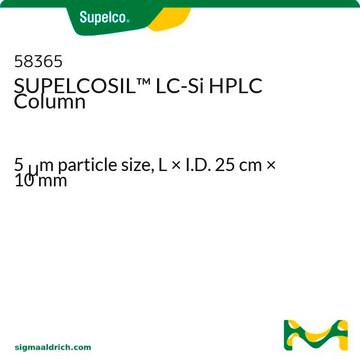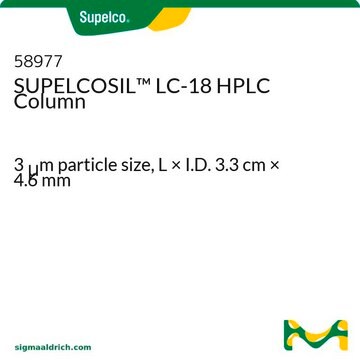58997
SUPELCOSIL™ LC-SCX (5 µm) HPLC Columns
L × I.D. 25 cm × 4.6 mm, HPLC Column
Sinónimos:
SCX column
About This Item
Productos recomendados
product name
Columna de HPLC SUPELCOSIL™ LC-SCX, 5 μm particle size, L × I.D. 25 cm × 4.6 mm
Agency
suitable for USP L52
Nivel de calidad
fabricante / nombre comercial
SUPELCOSIL™
Parámetros
≤70 °C temp. limit
400 bar pressure (5801 psi)
técnicas
HPLC: suitable
L × D.I.
25 cm × 4.6 mm
superficie
170 m2/g
matriz
silica gel, spherical particle platform
grupo activo de la matriz
sulfonic acid, propyl- phase
tamaño de partícula
5 μm
tamaño de poro
120 Å
intervalo de pH
2-7.5
aplicaciones
food and beverages
técnica de separación
cation exchange
¿Está buscando productos similares? Visita Guía de comparación de productos
Categorías relacionadas
Descripción general
Aplicación
Información legal
cartucho de precolumna
Código de clase de almacenamiento
13 - Non Combustible Solids
Clase de riesgo para el agua (WGK)
WGK 1
Punto de inflamabilidad (°F)
Not applicable
Punto de inflamabilidad (°C)
Not applicable
Elija entre una de las versiones más recientes:
¿Ya tiene este producto?
Encuentre la documentación para los productos que ha comprado recientemente en la Biblioteca de documentos.
Los clientes también vieron
Nuestro equipo de científicos tiene experiencia en todas las áreas de investigación: Ciencias de la vida, Ciencia de los materiales, Síntesis química, Cromatografía, Analítica y muchas otras.
Póngase en contacto con el Servicio técnico






